- Home
- Jonathan Lunn
Killigrew and the Incorrigibles Page 3
Killigrew and the Incorrigibles Read online
Page 3
‘Chop-house be damned! Tonight you dine here at the Harbour View Hotel.’ Thorpe turned to the hotelier. ‘This young man and his companion dine at my expense. Treat him well, Palgrave.’
‘Yes, sir.’
‘Really, sir, there’s no need,’ protested Killigrew. ‘We only did our duty.’
Thorpe was not having any of it. ‘Poppycock, sir, poppycock. Enjoy your meal. I should be delighted to join you myself, but I’ve been invited to dine with Sir William Denison, and it doesn’t do to turn down an invitation from the Lieutenant-Governor. Perhaps some other evening?’
‘Only if you allow me to return the courtesy of extending an invitation to you to dine in the wardroom on board the Tisiphone, sir. It’s not Rules, but our cook does tolerably well for us as long as we’re in harbour and there’s fresh meat and vegetables to be had; and we’ve a fair stock of wines on board.’
‘I shall be delighted, sir. My card.’ Thorpe presented him with a piece of pasteboard, before calling for his hat and cloak. ‘Enjoy your repast, Mr Killigrew. I can heartily recommend the turkey poults piqués et bardés.’ As soon as a flunkey had handed Thorpe his silk top hat, the gentleman raised it to Killigrew before placing it on his head. ‘Good evening, sir.’ Thorpe swept from the hotel in a swirl of evening cloak.
Killigrew glanced down at the card he was holding:
Thaddeus Thorpe, Merchant
c/o Thorpe & Co.
Thorpetown
New Hebrides
The lieutenant shrugged and tucked the card inside his jacket before turning back to the hotelier. ‘Will sir require to freshen up before he dines?’ Even after Thorpe had gone, the hotelier remained obsequiously polite, perhaps fearing that a report of a poor service might get back to the merchant’s ears.
Killigrew shook his head. ‘I’m due back on board my ship in an hour, which doesn’t allow me enough time to give what I’m sure would be an excellent meal the attention it deserves.’ It was a white lie: Killigrew did not want to give offence to Thorpe, but at the same time he did not feel comfortable accepting a free meal from a man about whom he knew nothing. ‘Which room was the injured man taken to?’
‘Room 107, sir.’
‘Thank you.’ Killigrew tripped lightly up the stairs to the room. The door was unlocked and he went in to find that the black had been laid on one of the beds where Strachan was attending him. ‘Can you do anything for him?’
‘Not without my medicine chest. You stay here with him while I send a flunkey to fetch a doctor. Then I’ll head back to the Tisiphone to see if I can persuade Westlake to come and attend to him.’
The black revived a little shortly after Strachan had gone and tried to get up, but Killigrew gently pushed him back down.
‘Rest easy, my bucko. A doctor’s on the way. Savvy English?’
‘Yes, sir. I speak English.’ Albeit with an American accent. ‘Thank you.’
‘Least we could do,’ said Killigrew. ‘Anyhow, don’t thank me; thank Mr Thaddeus Thorpe.’
‘Thaddeus Thorpe?’ Clearly the name meant no more to the injured man than it did to Killigrew.
‘Your benefactor.’ Killigrew gestured around the opulently appointed room. ‘He’s the one paying for all this, not I.’
‘Why?’
Killigrew shrugged. ‘Christian charity.’
‘Father Geddie teach me all about Christian charity. One-time I believe in it,’ the man added bitterly.
‘Well, perhaps tonight’s experience will renew your faith in human nature.’
The man glanced at his broken arm, and grimaced bitterly.
The lieutenant sat down in a chair and lit a cheroot with a match. ‘The name’s Killigrew, by the by. Kit Killigrew. What’s yours?’
‘They call me Johnny Blubbermouth.’
‘Not your real name, I’m sure.’
The man shook his head. ‘On my island I am called Wadrokal.’ He sighed as if he wished he were there now.
‘Your island?’
‘Aneiteium, in Vanuatu. The islands you call the New Hebrides.’
‘Ah, so you’re a Polynesian negro. Didn’t think you looked like a VDL Aboriginal, somehow. How did you come to break your arm like that, anyhow?’
Wadrokal turned his head away. ‘It does not matter.’
‘Perhaps I should rephrase the question. Who broke your arm?’ Even as Killigrew spoke, the door opened and three men entered. ‘I did,’ said one. He was a young man, not yet eighteen, tall and gangly, but he carried himself with a self-assurance beyond his years. He regarded Killigrew with cool grey eyes, a faint sneer playing on his lips.
Killigrew recognised one of the men who flanked him as the American Indian he had seen earlier when he had found Wadrokal in the street. The other was European, dark-haired and olive-complexioned. Both were dressed as sailors and had the kind of broad shoulders one got from a lifetime of pulling at oars and pushing at capstan bars.
The lieutenant stood up. ‘And you are?’
‘Peleg Starbuck,’ returned the young man. He spoke with the distinctive nasal twang of a New Englander, and could only be an officer of one of the many whaling ships that crowded Sullivan’s Cove. ‘You?’
‘Lieutenant Christopher Killigrew, HMS Tisiphone.’
Starbuck nodded thoughtfully. ‘I’m obliged to you, Mr Killigrew.’ His tone of voice suggested anything but obligation. He indicated Wadrokal. ‘This kanaka is a deserter from our ship. We’ll take care of him from now.’ He turned to the two sailors. ‘Vasques, Squanto: bring him.’
As the two sailors moved towards the bed, Wadrokal cringed away from them.
Killigrew quickly interposed himself. ‘I beg your pardon, have I misconstrued the situation in some way? I thought you said just now that you were the one who broke this poor fellow’s arm.’ Starbuck nodded. ‘That’s right. What of it?’
‘I’ve never been to the United States, Mr Starbuck, so I don’t know how you Yankees do things there. But Van Diemen’s Land happens to be a British colony, and we have laws here. I can assure you that the law takes a dim view of breaking people’s limbs.’
‘He’s not a person, he’s a kanaka. My kanaka.’
‘Slavery’s another thing we happen to have a law against. I’d like to think that one day the Americas will catch up with the rest of the world in that respect.’
‘Who said anything about slavery? This kanaka happens to be a contract labourer. Stand aside, Mr Killigrew. You’re starting to bore me.’
‘Sorry to be a hotel-room lawyer, but if you think I’m going to stand by and let you take this man after you’ve freely confessed to seriously injuring him—’
‘Do you like walking, Mr Killigrew?’
‘Walking?’
Starbuck nodded. ‘Because right now you’ve got a choice between walking out that door, or never walking again. Which is it to be?’
‘If you think I’m going to be intimidated by your threats—’
‘I’m not in the business of making threats. Vasques, Squanto: get rid of this jackass.’
A brass belaying pin slid out of Vasques’ sleeve and into his hand. He swung it at Killigrew’s head, but the lieutenant ducked and punched him in the stomach. Vasques doubled up, but even as Killigrew turned to face Squanto, the Indian drove a fist into one of his kidneys. Pain exploded in his side and he staggered. A hand smashed his head against the wall. The room spun, and Killigrew’s legs crumpled beneath him. Another blow landed against his ribs – a vicious kick, perhaps; he was too stunned by the sudden onslaught to be sure – and the room became dim.
‘Want me to kill him, Mr Starbuck?’
‘No. Just throw him out of the window.’
Squanto lifted the unresisting Killigrew under the armpits and Vasques had recovered enough to seize his ankles. By the time the full import of Starbuck’s instructions had hit Killigrew, the two sailors were swinging him between them and any attempt on his part to struggle was useless. On the count of three, they th
rew him out of the window without the courtesy of opening it first.
* * *
‘Roll up, roll up! Find the lady!’
Ordinary Seaman Seth Endicott glanced across to the crowd that had gathered around a man who had set out a folding table in the street in front of one of the waterfront taverns in Hobart Town. ‘What’s going on over there?’
‘Just a little game of three-card monte,’ Able Seaman Wes Molineaux told him. ‘Save your money – it’s rigged.’
The two seamen from the Tisiphone presented an unlikely pair: Endicott, a tall, lean Liverpudlian with lank fair hair and an eye for the ladies; and Molineaux, a broad-shouldered man with a shaven head and a gold ring through one ear. There was no shortage of seamen who wore earrings in an effort to look piratical, but Molineaux was one of the few who could carry it off.
Despite Molineaux’s warning, the two of them shouldered their way through the crowd to watch the broadsman cheat anyone foolish enough to think he could beat the house at ‘find the lady’. Inevitably, there was no shortage of takers. Some people never learned. The broadsman laid three cards face-up on his table: two jacks, and the queen of spades.
‘I’ll have a go,’ said a heavily built man with one of his front teeth missing. ‘How much is it?’
‘Anything over a tanner, cully,’ said the broadsman. ‘You pays your money and you takes your choice.’
The man put a sixpence piece on the table, and the broadsman flipped the cards over and moved them around one another. ‘Round and round and round she goes; where she ends up, nobody knows. Which one, cully?’
The man pointed to a card. The broadsman flipped it over and revealed the queen of spades. ‘You win,’ he said, giving the man back his sixpence and paying him a shilling on top. ‘Who’s next?’
‘I thought you said it was rigged?’ Endicott murmured to Molineaux.
‘That cove was a plant, to gammon flats like you. The next one will lose: you watch and see.’
Another man stepped forward and quickly proved that Molineaux did indeed have the gift of foresight: the second man went away disappointed.
‘Who’s next?’ asked the broadsman. ‘Who else wants to try their luck?’
‘Come on,’ said Molineaux, turning away. ‘Let’s catch up with the others.’
‘How about you, cully?’ the broadsman called after him. ‘All you’ve got to do is find the black lady. Should come naturally to you, Sambo!’
Molineaux froze.
Endicott groaned. ‘Come on, Wes. Leave it. He ain’t worth it.’
The black seaman turned back. ‘Give me a deaner, Seth.’
‘You ain’t going to lose it, are you?’
‘I’ll triple your money. Watch this.’ Molineaux stepped up to the table. ‘Find de black lady, you say?’ His London accent was gone, replaced by the patter of a comic ‘darky’ from a Marryat novel. ‘Why, dat sure do look easy to me, sho’nuff. I’se gwine to win me some money, oh yassur, lawdy!’ He put Endicott’s shilling on the table.
The broadsman grinned as he shuffled the cards around. He was thinking this was going to be like taking candy from a baby. ‘The swiftness of the hand deceives the eye. Find the lady, my friend.’
Molineaux indicated a card. ‘Dat one, mas’er. I’se sure dat’s de one, yassur, lawdy indeedy!’
The broadsman flipped over the card without bothering to glance down at its face. ‘Sorry, Sambo. You lose.’ A sharp intake of breath from the crowd made him look down. ‘What the hell…?’
‘Dat’s tree shillin’s you owes me, mas’er.’
‘No!’ protested the broadsman. ‘It can’t be! You cheated, you black bastard.’
‘What you mean, I cheated? You tole me to find de lady, and I’se gone done found her, mas’er. I won fair and square, sho’nuff.’ He reached for the money, but the broadsman snatched it away.
‘You bloody cheated! And I’ll tell you how I know: the queen of spades was up my sleeve the whole time,’ he declared triumphantly. He looked up his sleeve, found the card gone, and then blanched when he realised what he had said.
Molineaux caught him by the lapels and butted him on the bridge of the nose. As the broadsman went down with blood jetting from his nostrils, the broad-shouldered plant tried to grab Molineaux. The seaman twisted out of his grip, and then punched him in the stomach, once, twice, and then delivered a right cross to the point of his jaw. The plant staggered and sprawled on the cobbles.
Molineaux crouched over the dazed broadsman and helped himself to three shillings and a tanner from his pocket. ‘Let me give you a piece of advice, cully: never gammon a gammoning cove.’ He stood up and kicked the broadsman in the ribs. ‘And that’s for calling me “Sambo”, you dumb, good-for-nothing, pasty-faced piece of white trash.’
The crowd cheered and applauded. Molineaux bowed theatrically, and then tossed the sixpence to the man who had first been rooked, before handing Endicott two of the shillings. ‘There’s your deaner; and there’s a return on your investment.’ The other shilling he slipped in his own pocket. ‘That’s my commission.’
* * *
When Killigrew came to, he was lying amidst a pile of broken crates in the alley behind the hotel. He could not remember much about the fall from the first-floor window, but he was pretty sure the crates had been intact before he hit them. It was difficult to say whether the crates had broken his fall or made it worse: it was impossible to imagine more pain than he was already in, and he was no stranger to physical discomfort.
At last the sea of general agony that swamped him became focused in specific areas: his ankle, his shoulder, his ribs, his elbow. The worst was a throbbing pain in his temple that threatened to rob him of consciousness once more, and when he raised a hand to examine the bump he found the side of his head was sticky with blood. The least of his pains came from his leg: surprisingly, because when he glanced down he saw a large shard of glass he had fallen on had sliced through the kerseymere of his pantaloons and embedded itself in his thigh.
Hissing at the pain, he eased himself into a sitting position and plucked the glass from his thigh with a wince. The blood flowed freely, until he took out his linen handkerchief and bound it over the wound. He tried to stand up, but a smashed crate had somehow wrapped itself around his leg and when he pulled it away he saw he had put the knee through his pantaloons and grazed the skin beneath. But the real suffering started when he tried to put his weight on his other leg. It felt as though he had sprained his ankle, and he hobbled about the alley in a desperate effort to keep his balance.
Yet despite the multitude of his injuries, it was clear that none of them was immediately life threatening. After leaning against the wall of the alley to retch drily, his throbbing head had cleared enough for him to remember how he had come to be thrown out of the window in the first place – and to think what he intended to do about it.
He hobbled out of the alley, his teeth gritted against the pain that shot through his ankle every time he tried to put weight on it. His only plan was to stagger back into the hotel and send a flunkey to fetch a constable, before returning to the saloon bar for medicinal purposes. But as he rounded the corner at the front of the hotel, he was just in time to see Starbuck, Vasques and Squanto emerge from the front door, the American Indian dragging Wadrokal by the ankles behind him, heedless of the man’s broken arm bouncing against the cobbles. The pain would have been unbearable, if Wadrokal had not already fainted. Either that, or the three whaler-men had silenced him, either temporarily or permanently.
Seeing Wadrokal subjected to such ill usage gave Killigrew a feeling of tight rage in his stomach. He had often been warned that his explosive temper was going to be the death of him, but he was in no mood to curb it now.
‘Hi! You!’
Starbuck stopped and turned. Seeing Killigrew – and the state he was in – the youth laughed out loud. ‘Oh, dear. You are a glutton for punishment, aren’t you?’
Killigrew hobbled across to wher
e they stood. ‘I want a word with you,’ he snarled.
Starbuck arched an amused eyebrow. ‘A word? I’ll give you much more than that, my friend.’ He turned to the European sailor. ‘Vasques? Now you can kill him.’
‘My pleasure.’ Vasques produced his belaying pin once more and advanced on Killigrew. He swung the pin at the lieutenant’s head.
Killigrew blocked the blow with an upraised forearm, then caught Vasques by the wrist, spun him around, pushed him aside and tripped him up. The sailor sprawled on his back on the cobbles and Killigrew stamped on his crotch.
Squanto dropped Wadrokal’s ankles, drew a large knife from his belt and came at Killigrew. He slashed at the lieutenant’s chest. Killigrew jumped back, but then his ankle gave up on him and he fell to the ground with a gasp. Squanto kicked him in the side, and then reached down with his left hand to grab a fistful of the lieutenant’s shirtfront, lifting him up off the ground all the better to slash at his throat with the knife.
Killigrew caught him by the wrist with his left hand and smashed his right fist into the sailor’s jaw. Squanto’s head was snapped round, and he let go of Killigrew’s shirt. The lieutenant dropped back to the cobbles, and lashed out at one of Squanto’s kneecaps with the sole of one boot. The sailor went down with a scream.
Killigrew rolled on to his front and pushed himself to his feet. A large crowd of onlookers had gathered and stood in a circle to watch, keeping a safe distance. Ignoring them, Killigrew retrieved Squanto’s knife and advanced on Starbuck, dragging his right leg behind him.
Starbuck continued to regard him with amusement. ‘A knife,’ he sneered. ‘I’m shaking in my shoes.’
Killigrew’s ungainly advance was slow enough to give Starbuck plenty of time to unbutton his frock coat, pull out a revolving pistol and level it at the lieutenant’s head.
Killigrew froze. It was not the first time someone had drawn a gun on him. He had seen active service in the Levant and in China, and had faced slavers on the Guinea Coast and pirates in Borneo and the China Seas. He had faced death enough times for his own reaction to be familiar by now: that frisson of excitement that coursed through his veins like a drug, heightening his senses and tensing every nerve-ending in his body.

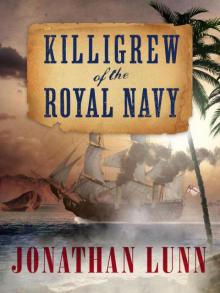 Killigrew of the Royal Navy
Killigrew of the Royal Navy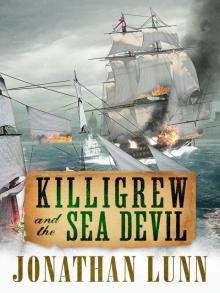 Killigrew and the Sea Devil
Killigrew and the Sea Devil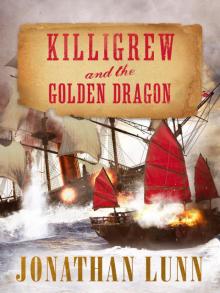 Killigrew and the Golden Dragon
Killigrew and the Golden Dragon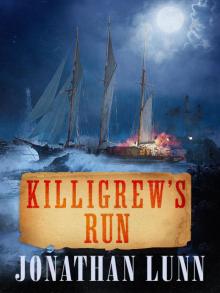 Killigrew’s Run
Killigrew’s Run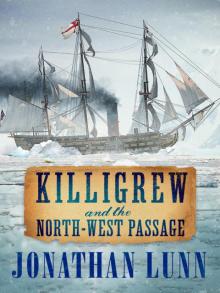 Killigrew and the North-West Passage
Killigrew and the North-West Passage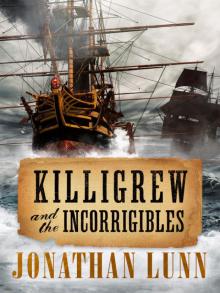 Killigrew and the Incorrigibles
Killigrew and the Incorrigibles